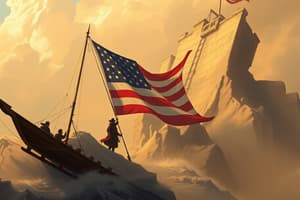Podcast
Questions and Answers
What was a main reason Richard Henry Lee proposed independence for the American colonies?
What was a main reason Richard Henry Lee proposed independence for the American colonies?
Which complaint against the British crown involved taxation without representation?
Which complaint against the British crown involved taxation without representation?
What was a major concern among the founding fathers regarding a centralized government?
What was a major concern among the founding fathers regarding a centralized government?
Which document proposed the amendments that later became the Bill of Rights?
Which document proposed the amendments that later became the Bill of Rights?
Signup and view all the answers
What principle did the early American leaders prioritize over a powerful national government?
What principle did the early American leaders prioritize over a powerful national government?
Signup and view all the answers
What significant characteristic differentiated the rights granted by the Constitution from those stated in the Bill of Rights?
What significant characteristic differentiated the rights granted by the Constitution from those stated in the Bill of Rights?
Signup and view all the answers
Which complaint specifically addressed the idea of British military aggression in colonial areas?
Which complaint specifically addressed the idea of British military aggression in colonial areas?
Signup and view all the answers
What event occurred 203 years after the proposal of the second article of the Bill of Rights?
What event occurred 203 years after the proposal of the second article of the Bill of Rights?
Signup and view all the answers
What was the primary purpose of the Monroe Doctrine as articulated by James Monroe in 1823?
What was the primary purpose of the Monroe Doctrine as articulated by James Monroe in 1823?
Signup and view all the answers
What major issues did the United States face under the Bretton Woods system?
What major issues did the United States face under the Bretton Woods system?
Signup and view all the answers
Which institutions were established at the Bretton Woods Conference?
Which institutions were established at the Bretton Woods Conference?
Signup and view all the answers
What challenges does the global economic system currently face according to the information provided?
What challenges does the global economic system currently face according to the information provided?
Signup and view all the answers
Under the Bretton Woods system, how was the value of currencies determined?
Under the Bretton Woods system, how was the value of currencies determined?
Signup and view all the answers
What was a significant consequence of the large deficits faced by the U.S. under the Bretton Woods system?
What was a significant consequence of the large deficits faced by the U.S. under the Bretton Woods system?
Signup and view all the answers
How did the Bretton Woods Conference influence international transactions?
How did the Bretton Woods Conference influence international transactions?
Signup and view all the answers
What ideology underpinned the U.S. intentions during the formulation of the Monroe Doctrine?
What ideology underpinned the U.S. intentions during the formulation of the Monroe Doctrine?
Signup and view all the answers
Study Notes
US Independence
- Richard Henry Lee (Virginia) proposed independence from Britain on June 7, 1776.
- 13 colonies formed an alliance for confederation to fight Britain.
- Proposed recognition of popular sovereignty, right to self-governance, and the right for property-holding individuals to participate in government.
- Excluded enslaved people and women from full political participation.
Grievances Leading to Independence
- 27 grievances presented to the King and Parliament to justify revolution.
- Key complaints included excessive taxation without representation, restrictions on trade, and abuses of military power, including the quartering of troops in colonial homes.
US Constitution
- 13 colonies, despite cultural differences, adopted Enlightenment principles and the pursuit of liberty.
- There was distrust of a centralized national government.
- Disagreements among Founding Fathers regarding federalism versus anti-federalism and state powers.
US Declaration of Rights
- Governmental powers in war, foreign policy, and trade were granted to the national government while state governments retained other powers.
- 12 amendments proposed to the Constitution in 1789; 10 were ratified by states (Bill of Rights) in 1791.
- The Bill of Rights comprises the first 10 amendments to the US Constitution.
Monroe Doctrine
- James Monroe (5th US President) issued a warning to European powers in 1823, stating that further efforts by European nations to take control of any independent state in North or South America would be viewed as "the manifestation of an unfriendly disposition toward the United States".
- Intended to protect the US and the Western Hemisphere from further European colonization.
- Also aimed to prevent European interference in the affairs of newly independent states in the Americas.
Bretton Woods System
- The Bretton Woods Agreement established a system where the value of the US dollar was pegged to gold and other currencies were pegged to the US dollar.
- Created international monetary institutions (IMF and World Bank).
- Goal included facilitating global trade and economic stability.
Challenges to Global Economic System
- The US dollar's value was not adequately supported by gold reserves.
- US trade deficits.
- Global financial pressures.
- Shift in global economic power dynamics.
- Rise of emerging economies (BRICS nations) as challenges to the established international order.
Studying That Suits You
Use AI to generate personalized quizzes and flashcards to suit your learning preferences.
Related Documents
Description
Explore the key events and grievances that led to the US Declaration of Independence, including the proposal for independence and the formation of a confederation. Learn about the foundational principles of the US Constitution and the debates among the Founding Fathers regarding governance and federalism.




